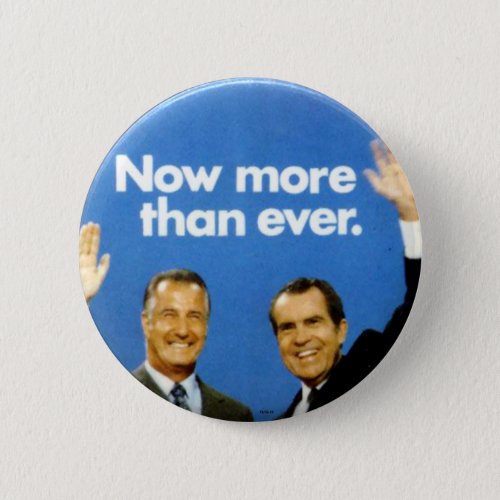Nixon-Agnew jugate - Button



Richard Milhous Nixon (January 9, 1913 – April 22, 1994) was the 37th President of the United States from 1969 to 1974, having formerly been the 36th Vice President of the United States from 1953 to 1961. A member of the Republican Party, he was the only President to resign the office as well as the only person to be elected twice to both the Presidency and the Vice Presidency. He was elected in 1946 as a Republican to the House of Representatives representing California's 12th Congressional district, using what became his trademark dirty tricks; the campaign is best remembered as one of the most contentious of the times. Nixon called his opponent a left-wing sympathizer, labeling her "pink right down to her underwear." Conversely, Douglas referred to Nixon as "Tricky Dick", a derisive nickname which remained with him for the rest of his life. In the Senate, Nixon was a prominent foe of the spread of global communism, "the threat." He also criticized what he perceived to be President Harry S. Truman's mishandling of the Korean War. He voted in favor of civil rights for minorities, and against price controls and other monetary controls, benefits for illegal immigrants, and public power. He was selected In part because of his reputation as an ardent anti-communist to be the running mate of Dwight D. Eisenhower, the Republican Party nominee, in the 1952 Presidential election, becoming one of the youngest Vice Presidents in history. As Vice President, Nixon expanded the office into an important and prominent post. Nixon would conduct National Security meetings in the president's absence. He waged an unsuccessful presidential campaign in 1960, narrowly losing to John F. Kennedy, and an unsuccessful campaign for Governor of California in 1962; following these losses, Nixon announced his withdrawal from political life. In 1968, however, he ran again for president of the United States and was elected.Throughout the campaign Nixon portrayed himself as a figure of stability during a period of national unrest and upheaval. He appealed to what he called the "silent majority" of socially conservative Americans who disliked the hippie counterculture and the anti-war demonstrators, and secured the nomination in August. His running mate, Maryland governor Spiro Agnew, became an increasingly vocal critic of these groups, solidifying Nixon's position with the right. The most immediate task facing President Nixon was a resolution of the Vietnam War. He initially escalated the conflict, overseeing incursions into neighboring countries, though American military personnel were gradually withdrawn and he successfully negotiated a ceasefire with North Vietnam in 1973, effectively ending American involvement in the war. His foreign policy initiatives were largely successful: his groundbreaking visit to the People's Republic of China in 1972 opened diplomatic relations between the two nations, and he initiated détente and the Anti-Ballistic Missile Treaty with the Soviet Union. On the domestic front, he implemented the concept of New Federalism, transferring power from the federal government to the states; new economic policies which called for wage and price control and the abolition of the gold standard; sweeping environmental reforms, including the Clean Air Act and creation of the EPA; the launch of the War on Cancer and War on Drugs; reforms empowering women, including Title IX; and the desegregation of schools in the deep South. He was reelected by a landslide in 1972. He continued many reforms in his second term, though the nation was afflicted with an energy crisis. In the face of likely impeachment for his role in the dirty tricks cover-up for the Watergate break-in to Democratic Campaign Headquarters. Nixon resigned in disgrace on August 9, 1974. He faced impeachment felony charges, but was pardoned by his successor, Gerald Ford, for any federal crimes he may have committed while in office. In his retirement, Nixon became a prolific author, writing many books explaining himself, and undertook many foreign trips. His work as an elder statesman helped to somewhat rehabilitate his public image. He suffered a debilitating stroke on April 18, 1994, and died four days later at the embittered age of 81. Repro pub dom.


